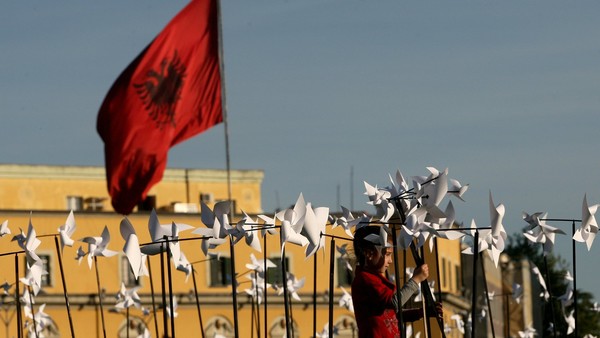 ©AFP
©AFP
Model economy: Albanian flag flying above centre of capital Tirana
Bosnia,
Serbia, Albania and Ukraine are economically weak, desperate to
integrate with the EU, and still carrying deep scars from recent war and
revolution. So what makes their EU trade model so attractive for Brexit campaigners?
The praise for the Albania-Ukraine option voiced by Michael Gove,
justice secretary, echoes the work of pro-leave analysts who see the
countries charting “a way forward” that combines free trade with
tailored political co-operation.
The hitch is that Brussels sees the pacts — known as “stabilisation and association agreements”
in the western Balkans — as special support at the start of a long
journey towards EU membership for relatively small, troubled economies,
rather than a divorce settlement for a big, successful one.
Karel De Gucht, the EU’s former trade commissioner, said any Brexit
comparison was “ridiculous nonsense”. “Albania is a poor country, a
small economy, under-developed,” he said. “It is like comparing a little
nut with a big watermelon.”Olli Rehn, who negotiated such pacts as EU enlargement commissioner, said he was “surprised” the Leave side would want an agreement that would put the UK “permanently on the substitute bench”.
“Besides, I doubt the UK could get the same asymmetric preferential treatment that the western Balkan countries have, as this is intended to support their economic development and European integration path."
The main attractions for Leave supporters are outlined in Business for Britain’s 1,000-page research document called “Change or Go”.
This looked at Ukraine’s “deep and comprehensive trade agreement” as
an “alternative model” to joining the European Economic Area. It allows
for a close economic relationship with the EU, without the political and
financial obligations of an EEA country like Norway, which
semi-automatically applies EU law, accepts free movement and pays into
the EU budget.
The report argues the Ukraine trade deal — hatched under the shadow of the Russian annexation of Crimea and war in eastern Ukraine —
was an “under-examined way forward” that covers “all the key aspects as
well as lightening the obstacles to trade, but without uniformly
applying red tape across the home economy”.
It goes on to say the format has similarities with the EU’s approach
to former communist countries in the western Balkans — first called the
“Central European Free Trade Agreement”. These attempted to clear trade
barriers without cumbersome requirements to pool sovereignty or accept
rules wholesale.For a country like Albania, this has morphed into an association agreement that sets a framework for it to move closer EU law and business standards, in part to give EU investors confidence to work in the country.
What Brexit means for the UK economy

In financial services it also relates to a tiny Albanian cottage industry, with barely any integration with the European market, whereas the City of London is the continent’s biggest financial hub, handling 40 per cent of wholesale euro-denominated trade.
While Leave campaigners may see the appeal of such a loose association to anchor Britain’s post-Brexit relations, the deal will still need unanimous support from all EU member states.
Even if EU states are willing to cut a favourable
deal with Britain, the political difficulties of implementing it were
demonstrated this month when the Netherlands rejected the planned trade pact with Ukraine in a referendum.
The consultative vote, which could ultimately scupper part of the
Ukraine deal, was hailed by Nigel Farage, the UK Independence party
leader, as “a victory for democracy” and “new politics”.
No comments:
Post a Comment